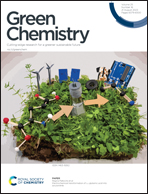Catalyst-free mechanochemistry as a versatile tool in synthetic chemistry: a review
Abstract
A notable advancement of the mechanochemical process has been its ability to initiate reactions that are otherwise extremely difficult/impossible to accomplish. For the first time, in this article, we review the reports on catalyst-free mechanochemical organic transformations. In the literature search, it was evident that catalyst-free mechanochemistry is proving to be superior to catalyst-aided methods, particularly in the reactions of enaminones/enamino esters, aza-Michael additions, Knoevenagel condensations, heterocyclization of amines, synthesis of quinoxalines/dibenzophenazines, cycloadditions, reactions of carbohydrates and fullerenes, transfer hydrogenations, halofunctionalizations, hydroxyfunctionalizations, synthesis of C![[double bond, length as m-dash]](https://www.rsc.org/images/entities/char_e001.gif) N (imines and hydrazones) and amide bonds, and multicomponent synthesis of oxygen/nitrogen-heterocycles, nitrogen-rich compounds and organic cage structures. Mechanochemical protocols in the selected area generally involve ball milling (including vibrational and planetary milling) and grinding, but ball milling is more prevalent. Twin screw extrusion and vortex mixing were rarely used in the reviewed articles. Furthermore, the reviewed research demonstrated high yields while avoiding non-renewable, toxic, and problematic solvents and reagents. There have been very few solvent-assisted reports where a bio-renewable solvent such as EtOH was used. This review on catalyst-free mechanochemical organic synthesis is intended to spark the interest of the chemical community, including industry and academia, towards working on the selected area concerning chemical as well as environmental sustainability.
N (imines and hydrazones) and amide bonds, and multicomponent synthesis of oxygen/nitrogen-heterocycles, nitrogen-rich compounds and organic cage structures. Mechanochemical protocols in the selected area generally involve ball milling (including vibrational and planetary milling) and grinding, but ball milling is more prevalent. Twin screw extrusion and vortex mixing were rarely used in the reviewed articles. Furthermore, the reviewed research demonstrated high yields while avoiding non-renewable, toxic, and problematic solvents and reagents. There have been very few solvent-assisted reports where a bio-renewable solvent such as EtOH was used. This review on catalyst-free mechanochemical organic synthesis is intended to spark the interest of the chemical community, including industry and academia, towards working on the selected area concerning chemical as well as environmental sustainability.

- This article is part of the themed collection: 2023 Green Chemistry Reviews


 Please wait while we load your content...
Please wait while we load your content...